Float under the stars
Embrace a darkness that’s too rare in our modern world, by floating on the lake surface and gazing at distant constellations shining above. From connecting with the past to experiencing a child-like magic, what could be more memorable than a night swim under the stars?
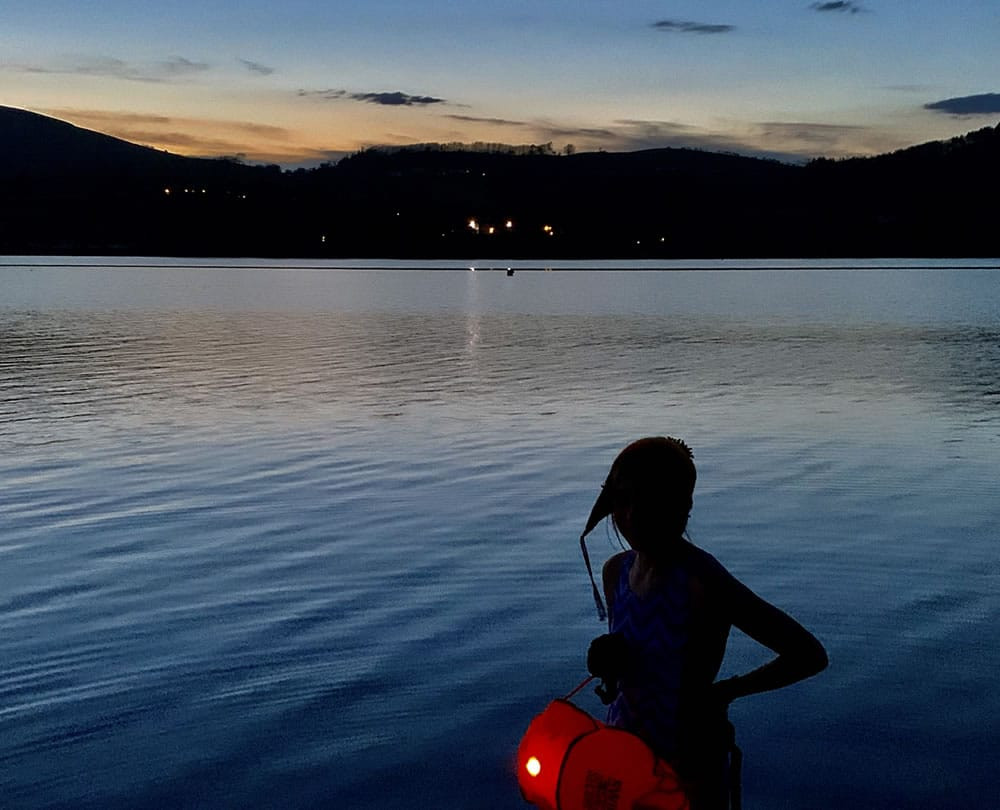
Night swimming
Colin Hill, our resident swim coach leads our Full Moon Swims, where guests are given the opportunity to take a night-time swim under nothing but lunar light.
Throughout the year, Colin invites guests to try a Stargazing Night Swim, timed with the New Moon, which allows you to experience the thrill of staring up at glistening stars and galaxies from the dark surface of the lake.
“The moon swims have been fantastic, but there’s still a surprising amount of light around – assuming the moon decides to make an appearance, that is, which is never guaranteed in Cumbria!” he laughs. “The idea behind the New Moon swims is to really embrace the darkness. Without any moonlight, you can see the stars with a clarity you just can’t get on land.”
Colin’s interest in night-time swimming developed over many years during his work as an open water swim consultant for FINA, world swimming’s governing body. He has since swum everywhere from Slovenia to the Seychelles, but has now settled down along the shores of Ullswater.
His night swims are “more of a potter than a full-on swim”, he says: guests are equipped with full wetsuits and illuminated tow-floats to make the experience as safe and comfortable as possible. The idea isn’t to exert yourself: it’s simply to experience what it feels like to be out in the lake in complete, total darkness.
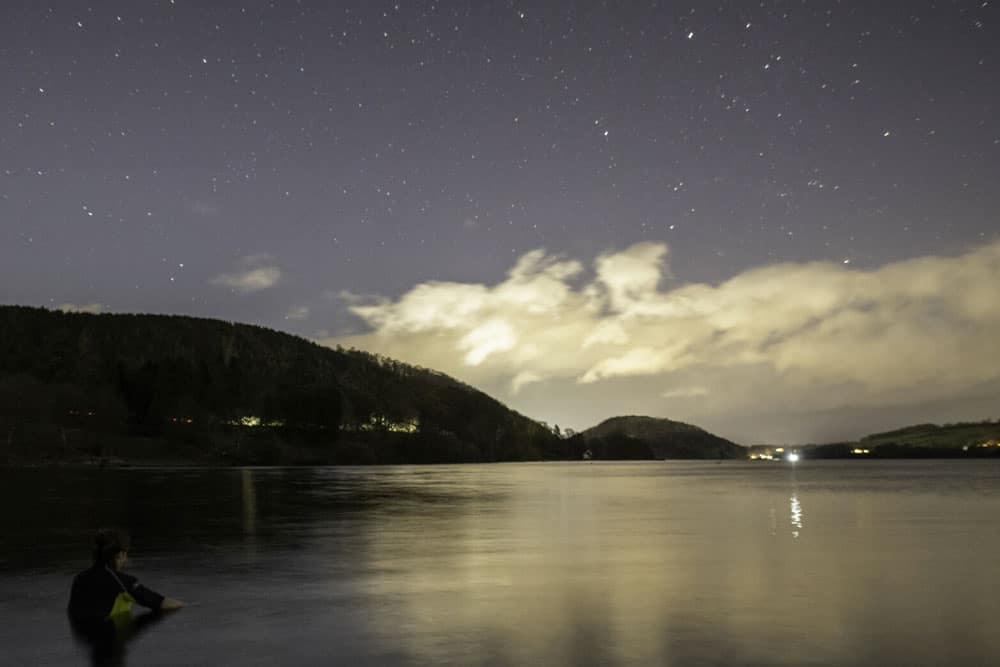
“You’re immersed in nature, in this ancient glacial lake, lost in silence, surrounded by the fells… Floating on our backs, looking up into the blackness, not really being able to tell where the lake ends and where the sky begins, with nothing but stars overhead.”
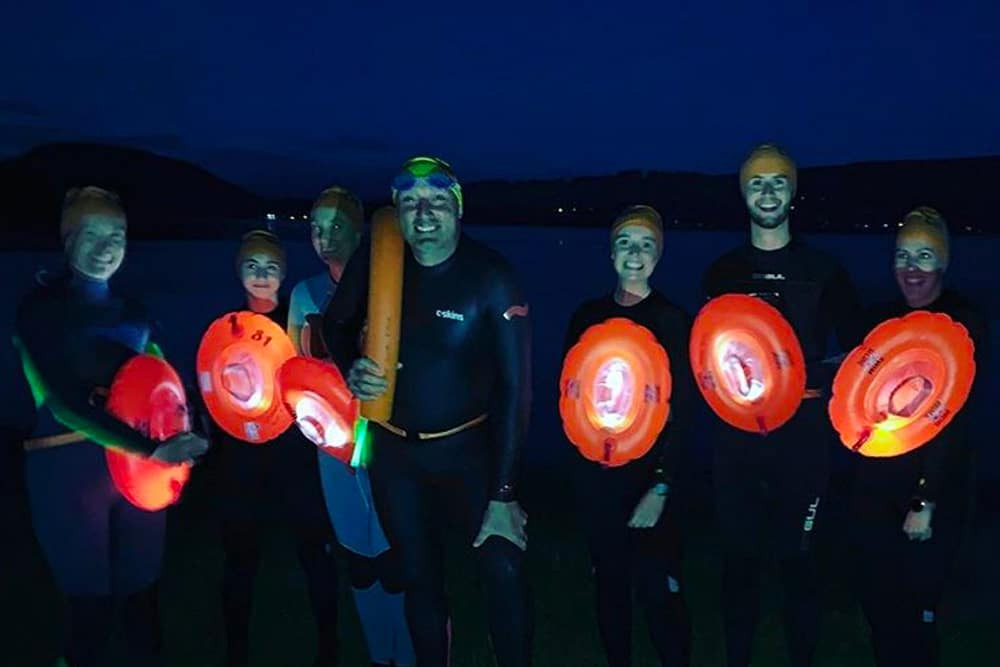
“It’s hard to describe how it feels until you’ve done it,” he explains. “You’re immersed in nature, in this ancient glacial lake, lost in silence, surrounded by the fells. People are often a bit nervous about swimming in the dark to begin with: you can often hear the trepidation in their voices as they walk down to the lakeshore. But as soon as they get into the water, all their inhibitions disappear. There’s something almost childlike about it. The feeling of just floating on our backs, looking up into the blackness, not really being able to tell where the lake ends and where the sky begins, with nothing but stars overhead.”
He pauses, wondering how to accurately describe the experience.
“It’s magic,” he says. “It really is. Magic. That’s the only word there is for it.”
Star struck
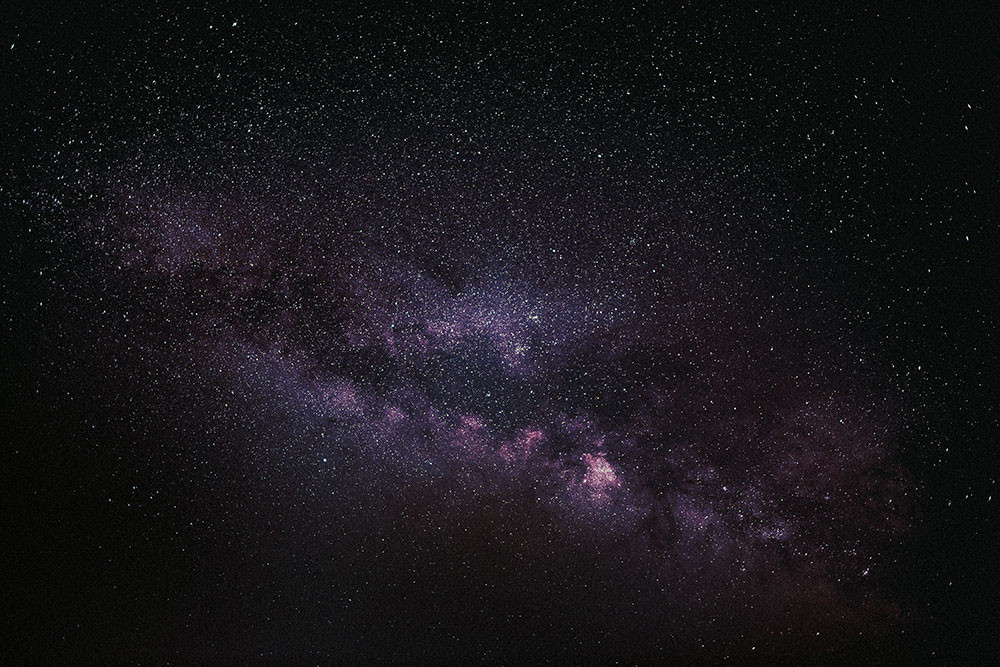
Those stars, that glide behind them or between,
Now sparkling, now bedimmed, but always seen:
Yon crescent Moon, as fixed as if it grew
In its own cloudless, starless lake of blue;
I see them all so excellently fair,
I see, not feel, how beautiful they are!
From ‘Dejection: An Ode’, by Samuel Taylor Coleridge
Coleridge and Wordsworth were passionate stargazers. Their poems are littered with stars. They light up the skies in ‘Frost at Midnight’. They illuminate ‘The Rime of the Ancient Mariner’ with their eerie, otherworldly glow. They spangle the skies of Wordsworth’s childhood epic, ‘The Prelude’. They symbolise hope and solace, wildness and mystery; an intimation of the eternal and unknowable, firing the poetic imagination.
In the 21st century, however, Coleridge and Wordsworth would be disillusioned by the state of Britain’s night skies. Light pollution is one of the scourges of our times: spilling out from street lamps, glaring from office blocks, seeping from shop windows, the incandescent lightbulb bathes the world in a constant sulphur-yellow glow. According to a study published in Science Advances, it’s thought that more than 80% of the world’s population now live under light-polluted skies.
But there are places to escape, if you know where to look…
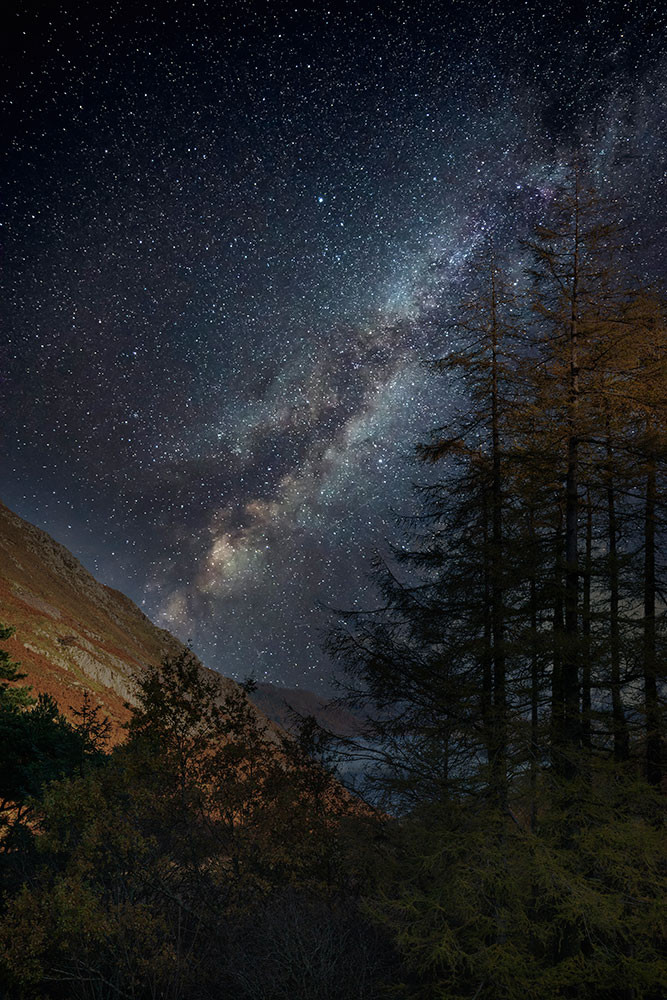
Thanks to the work of astronomical advocacy organisations like the International Dark Sky Association, there is a growing movement to restore the world’s skies to darkness. The world now has 13 official Dark Sky Reserves, four of which are located in the UK (the Brecon Beacons, Exmoor, Snowdonia and the South Downs).
While not officially a Dark Sky Reserve, the Lake District is also very close. Light levels are measured in terms of luminosity: the brightest place in the UK is Glasgow, with an average of 1500, followed by London, with an average of 850. By contrast, the Lake District’s brightest spot is Keswick, with a luminosity level of just 12. The rest of the National Park doesn’t even register on the scale, with light pollution levels of near zero.
Organisations including the Friends of the Lake District, Cumbria Tourism and the Lake District National Park Authority are currently lobbying for official Dark Sky Reserve status. They also organise the annual Dark Skies Festival – a series of astronomical films, talks and activities – which took place between 28 October and 18 November in 2023.
To find your closest dark skies festival, click here.
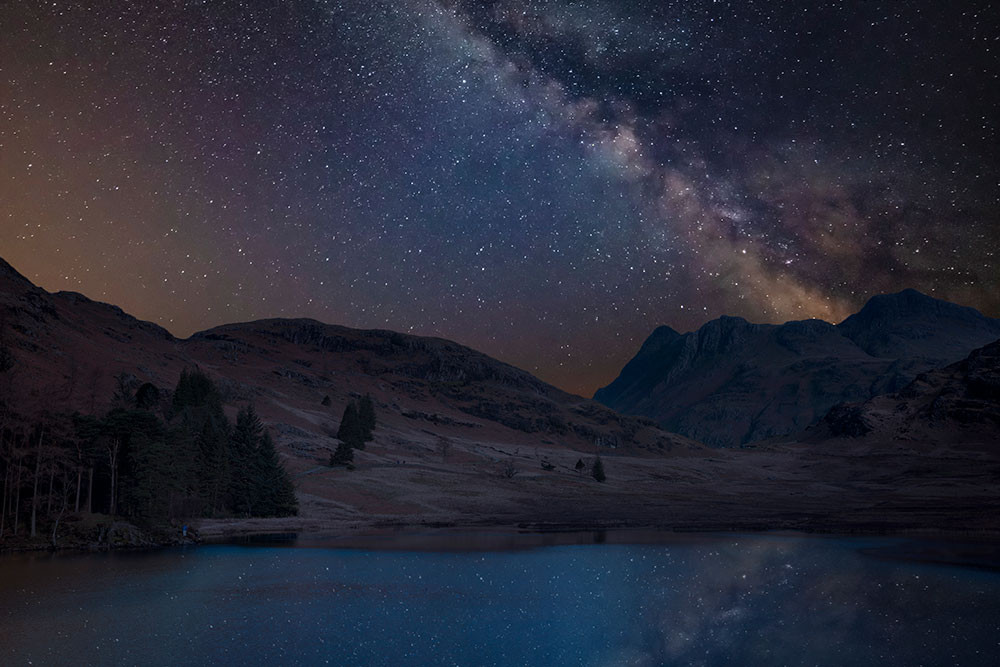
Star power
“You just take the stars for granted, growing up here,” explains Steve Wharton, a storyteller, musician and folk historian whose work is deeply rooted in the Lake District’s landscape. “There were never many buses when I was a kid, so we used to walk around all the time at night. Walking home on the dark lanes, gazing up at the stars. I’ve been fascinated by them ever since.”
Born in Ulverston and now based near Wasdale (having lived everywhere from Finland to China in between), Steve has a lifelong passion for Lakeland’s skies. For a while, he worked at Black Sail YHA, England’s remotest hostel. Hidden away in the empty fells above Ennerdale, with no mains electricity, it’s a place beloved by many walkers for its solitude – but for Steve, it’s the stars he remembers most.
“The night skies up there are incredible,” he recalls. “You’re hidden amongst these high fells, miles and miles from the nearest town. The skies there are as clear as any I’ve seen in England. You really get a sense of how the night sky must have appeared to our ancestors: as a living, present landscape. You feel this deep sense of connection to the past.”
But it’s the link between stars and storytelling that Steve finds most interesting, and a lot of his work is inspired by folklore.
“It’s intriguing to me how many ancient cultures had their own beliefs about the stars,” he says. “In some they’re seen as animist gods or deities; in others they’re the spirits of the ancestors looking down on the human world. Often, holy sites were orientated around celestial objects, so the stars must have held huge importance. I’d love to know exactly what the stars meant to ancient Britons: the stories they told about them, the characters they gave to them, the legends they wove around them. Sadly, we’ll never know.”
Some favourite places for star spotting in the Lake District
Ennerdale
Lakeland’s wildest valley is currently the focus of one of the UK’s largest rewilding projects. With most signs of human habitation removed, it’s unsurprisingly a glorious spot for stargazing: a night at the Black Sail YHA is an ideal way to experience it.
Wasdale
Overlooked by the lofty summits of Scafell Pike and Great Gable, this deep glacial valley has just a handful of houses, meaning there is almost zero light pollution. And if you fancy a restorative pint after your stargazing session, the historic Wasdale Head Inn is on hand.
Low Gillerthwaite Field Centre
Set in a 17th century farmhouse on an old sheep-farm, this field studies centre is a designated Dark Sky Discovery Site. Look out for stargazing sessions on their website.
Grizedale Forest
Managed by the Forestry Commission, this 25km² woodland situated between Coniston and Hawkshead often hosts astronomy workshops with local scientist and astronomer Robin Ince.
Allan Bank
This handsome house near Grasmere (once occupied by Wordsworth, but now owned by the National Trust) is the Lake District’s second official Dark Sky Discovery Site.
Discover more in our Lake District Stargazing Guide